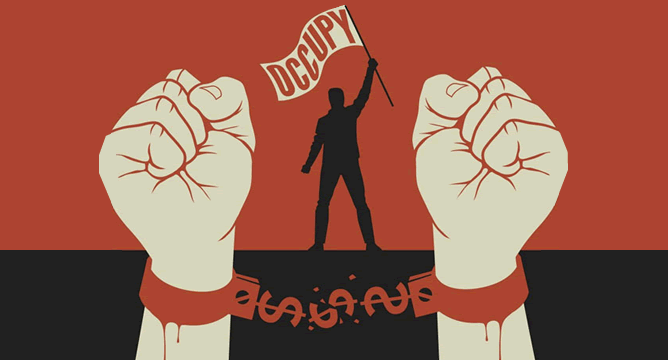 Marxism, Materialism, and Anthropology
Marxism, Materialism, and Anthropology
Course Description
A seminar in marxist theory and method as it relates to anthropology as a discipline and as a practice.
Economic, social, cultural crises abound. We live in a time of flux and disruption. Riots, protests, state repression - all
very real aspects of our contemporary world. Yet, it is not sufficient to simply describe what we see; we need to make sense of it and then
to act. This course explores one body of theory that is returning to consideration - the writing and practice of Karl Marx.
We are particularly interested in the relation of Marx's theory with the discipline of anthropology and cognate social sciences.
Thomas Patterson makes a compelling argument that Karl Marx is an anthropologist. Marx, Patterson reminds us,
was interested in more then simply what is today the narrow field of economics. Marx’s interests included the whole
of humanity from early origins to contemporary systems of belief and the need to create a more humane and just
social order. While the core of anthropology is arguably more Durkheimian than Marxist, anthropology has been
engaged in a dialogue with Marx since it’s earliest formations.
This seminar will explore the key ideas of Karl Marx’s writing. We will examine and compare these ideas with other forms
of materialism. Ultimately we will examine the place of Marx’s thought within contemporary anthropological practice.
Our goal is learn and to understand first. Critique, while important, will follow after we have mastered Marx’s core ideas
and their relationship to other anthropological materialisms. Over the course of the past couple of decades we in anthropology,
like our colleagues in cognate disciplines, have become enamoured with critique for critique-sake. In the process we have lost
some of our ability to understand the work that we are busy critiquing. So, in this course we will start from the primary texts,
read them, consider them, and work to apply them in the context of our current and planned anthropological practice.
Couse Readings
The following is a provisional list of key sources. Students should note that our primary objective
will be first to understand the core concepts of Marxist theory. Second to examine who these theories have been
applied within Anthropology. Third to consider alternative materialisms and their relationship to
Marxism and Anthropology.
Required Textbooks (Provisional List)
Classical Marxist Works
Additional primary sources will be consulted. Socialism: Utopian and Scientific is a good basic primer to marxist theory.
Frederick Engels. 1970.
Socialism: Utopian and Scientific.
Moscow: Progress Publishers.
On Marx, Biography and Theory
Thomas C. Patterson. 2009. Karl Marx, Anthropologist. New York: Berg Press.
Anthropological Works that Apply or Derive from Marxist Theory
We will focus on books that are either by Canadian-based academics or contain Canadian subject matter.
Thomas W. Dunk. 2003. It's a Working Man's Town: Male Working-Class Culture. McGill-Queen's University Press;
Revised edition edition
Belinda Leach & Anthony Winson. 2002. Contingent Work, Disrupted Lives: Labour and Community in the New Rural Economy.
Toronto: UTP.
Meg Luxton. 2009. More than a Labour of Love: Three Generations of Women's Work in the Home.
Gerald M. Sider. 2003.
Between History and Tomorrow: Making and Breaking Everyday Life in Rural Newfoundland.
Toronto: University of Toronto Press.
Susan Vincent. 2012. Dimensions of Development. History, Community, and Chnage in Allpachio, Peru.
Toronto: University of Toronto Press.
Useful Additional Works (Provisional List)
David Harvey. 2012.
Rebel Cities. London: Verso.
Eric R. Wolf. 1982. Europe and the People Without History. Berkeley: University of California Press.
Eric R. Wolf. 1999. Envisioning Power. Berkeley: University of California Press.
Key Chapters, Articles, and Excerpts. (Provisional List)
Please note that for most of the following readings you need to view them from within the UBC VPN or
UBC local network as they are protected by copyright and only available through subscriptions.
Some sources (like the Marcus & Menzies article) are open access. However, the majority are not.
Salon: The Urban Revolution is Coming.
Towards a class struggle anthropology. Marcus & Menzies 2007.
Marxist Approaches in Anthropology. O'Laughlin 1975.
Political Economy. Rosberry 1988.
Marx and Anthropology. Rosberry 1997.
Anth Blog
Background notes, commentaries, and resources can be found on an anthropology blog written by C. Menzies:
http://blogs.ubc.ca/anth100
A Note on Laptops in Class
Laptops, cell phones, and any other form of electronic recording or communication device will not be used
in our class. There are good reasons for some people with documented
learning
profiles to use laptops to take notes rather than using pen and paper.
However, for most people the art and craft of writing notes by
hand still remains a critical practice to engage in. As potential and
aspiring anthropologists you will find yourself in locations in
which the only way to take notes is by paper and pen. Please consider
this to be a practicing ground for those circumstances.
There are no good reasons (under normal circumstances) to use a cell phone in class.
Additional Resources
Anthropology and Society. Podcasts of presentations made by Charles Menzies on a variety of topics.
Some of the items may have relevance for the course. To access a podcast of available presentations copy this URL
http://www.ecoknow.ca/podcast/rss.xml
and paste it into your podcast software application or click here
to select individual talks.
 Marxism, Materialism, and Anthropology
Marxism, Materialism, and Anthropology